新概念英语第二册课后题答案详解:Lesson19
- 格式:docx
- 大小:38.18 KB
- 文档页数:3
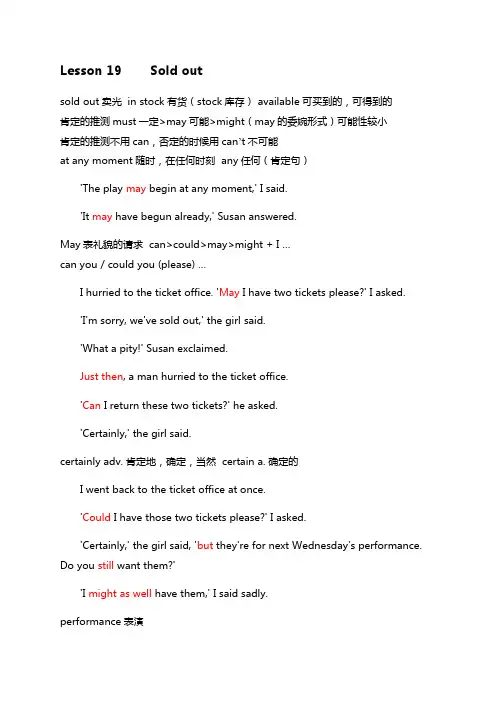
Lesson 19 Sold outsold out卖光 in stock有货(stock库存) available可买到的,可得到的肯定的推测must一定>may可能>might(may的委婉形式)可能性较小肯定的推测不用can,否定的时候用can’t不可能at any moment随时,在任何时刻 any任何(肯定句)'The play may begin at any moment,' I said.'It may have begun already,' Susan answered.May表礼貌的请求 c an>could>may>might + I …can you / could you (please) …I hurried to the ticket office. 'May I have two tickets please?' I asked.'I'm sorry, we've sold out,' the girl said.'What a pity!' Susan exclaimed.Just then, a man hurried to the ticket office.'Can I return these two tickets?' he asked.'Certainly,' the girl said.certainly adv. 肯定地,确定,当然 certain a. 确定的I went back to the ticket office at once.'Could I have those two tickets please?' I asked.'Certainly,' the girl said, 'but they're for next Wednesday's performance. Do you still want them?''I might as well have them,' I said sadly.performance表演生词和短语hurry v. 匆忙 n. 匆忙 hurry up in a hurry curry咖喱He went to school in a hurry. = He hurried/rushed to school. rush冲ticket office 售票处 box office售票处,票房pity n. 令人遗憾的事 What a pity! 好遗憾啊!It’s a pity that …excla i m v. 大声说,惊叫 claim v. 声称,索取 baggage claim取行李处=cry out大声喊=call out exclamation n. 呼喊,感叹 ~ mark感叹号 expla i n – explanation n. 解释 question mark问号return v. 退回sad ly adv. 悲哀地,丧气地 She was sad. She said sadly.。
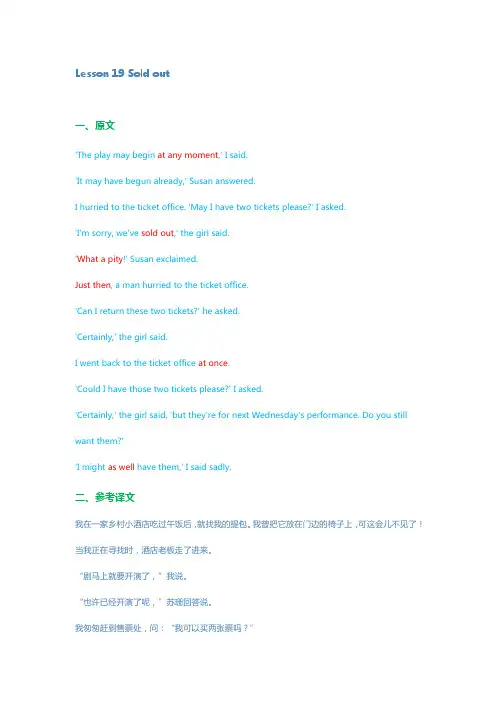
Lesson 19 Sold out一、原文'The play may begin at any moment,' I said.'It may have begun already,' Susan answered.I hurried to the ticket office. 'May I have two tickets please?' I asked.'I'm sorry, we've sold out,' the girl said.'What a pity!' Susan exclaimed.Just then, a man hurried to the ticket office.'Can I return these two tickets?' he asked.'Certainly,' the girl said.I went back to the ticket office at once.'Could I have those two tickets please?' I asked.'Certainly,' the girl said, 'but they're for next Wednesday's performance. Do you still want them?''I might as well have them,' I said sadly.二、参考译文我在一家乡村小酒店吃过午饭后,就找我的提包。
我曾把它放在门边的椅子上,可这会儿不见了!当我正在寻找时,酒店老板走了进来。
“剧马上就要开演了,”我说。
“也许已经开演了呢,”苏珊回答说。
我匆匆赶到售票处,问:“我可以买两张票吗?”“对不起,票已售完。
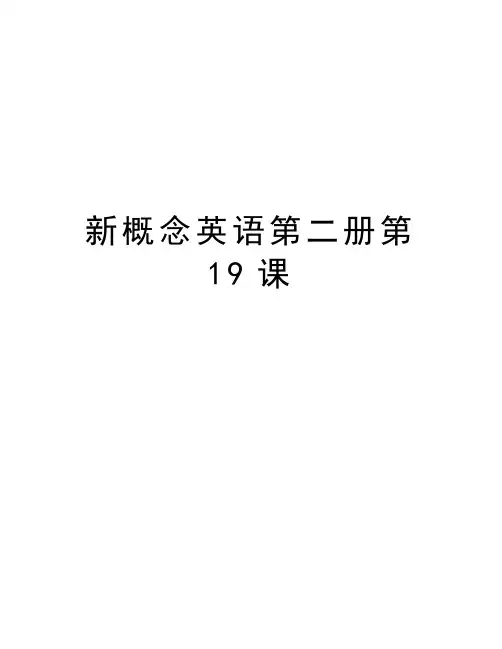
新概念英语第二册第19课精品文档Lesson 19 sold out 票已售完After I had had lunch at a village pub, I looked for mybag. I had left it on a chair beside the door and now itwasn't there! As I was looking for it, the landlord camein.'Did you have a good meal?" he asked.'Yes, thank you,' I answered, 'but I can't pay the bill. Ihaven't got my bag.'The landlord smiled and immediately went out. In afew minutes he returned with my bag and gave it back tome.'I'm very sorry,' he said. 'My dog had taken in into thegarden. He often does this!'New words and expressions 生词和短语pub [pʌb] n. 小酒店landlord [ˈlændlɔrd] n. 店主bill [bɪl] n. 帐单参考译文:我在一家乡村小酒店吃过午饭后,就找我的提包。
我曾把它放在门边的椅子上,可这会儿不见了!当我正在寻找时,酒店老板走了进来。
“您吃得好吗?”他问。
“很好,谢谢。
”我回答,“但我付不了帐,我的提包没有了。
”酒店老板笑了笑,马上走了出去。
一会儿工夫他拿着我的提包回来了,把它还给了我。
“实在抱歉,”他说,“我的狗把它弄到花园里去了,他常干这种事!”Text1.After I had had lunch at a village pub, I looked for my bag.2. I had left it on a chair beside the door and now it wasn't there!3.As I was looking for it, the landlord came in.4.'Did you have a good meal?" he asked.5.'Yes, thank you,' I answered, 'but I can't pay the bill. I haven't got my bag.'6.The landlord smiled and immediately went out.7. In a few minutes he returned with my bag and gave it back to me.8.'I'm very sorry,' he said. 'My dog had taken in into the garden. He often does this!'参考译文1.我在一家乡村小酒店吃过午饭后,就找我的提包。
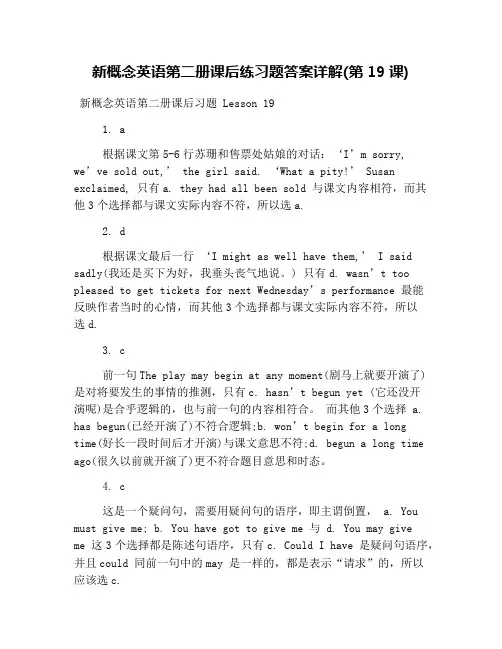
新概念英语第二册课后练习题答案详解(第19课)新概念英语第二册课后习题 Lesson 191. a根据课文第5-6行苏珊和售票处姑娘的对话:‘I’m sorry, we’ve sold out,’ the girl said. ‘What a pity!’ Susan exclaimed, 只有a. they had all been sold 与课文内容相符,而其他3个选择都与课文实际内容不符,所以选a.2. d根据课文最后一行‘I might as well have them,’ I said sadly(我还是买下为好,我垂头丧气地说。
) 只有d. wasn’t too pleased to get tickets for next Wednesday’s performance 最能反映作者当时的心情,而其他3个选择都与课文实际内容不符,所以选d.3. c前一句The play may begin at any moment(剧马上就要开演了)是对将要发生的事情的推测,只有c. hasn’t begun yet (它还没开演呢)是合乎逻辑的,也与前一句的内容相符合。
而其他3个选择 a. has begun(已经开演了)不符合逻辑;b. won’t begin for a longtime(好长一段时间后才开演)与课文意思不符;d. begun a long time ago(很久以前就开演了)更不符合题目意思和时态。
4. c这是一个疑问句,需要用疑问句的语序,即主谓倒置, a. You must give me; b. You have got to give me 与 d. You may giveme 这3个选择都是陈述句语序,只有c. Could I have 是疑问句语序,并且could 同前一句中的may 是一样的,都是表示“请求”的,所以应该选c.动词let 后面只能跟不带to 的动词不定式才合乎语法即let sb. do sth.. a. having 是现在分词,不符合语法; b. to have 中动词不定式不应该带to, 也不合乎语法;c. had 是动词的过去式,也不符合语法; 只有d. have 是不带to 的动词不定式,所以应该选d.6. b这个句子的时间状语 next Wednesday 下星期三,班是表示将来的时间,所以需要用将来时态。
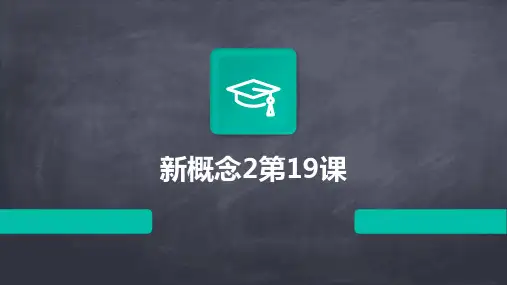
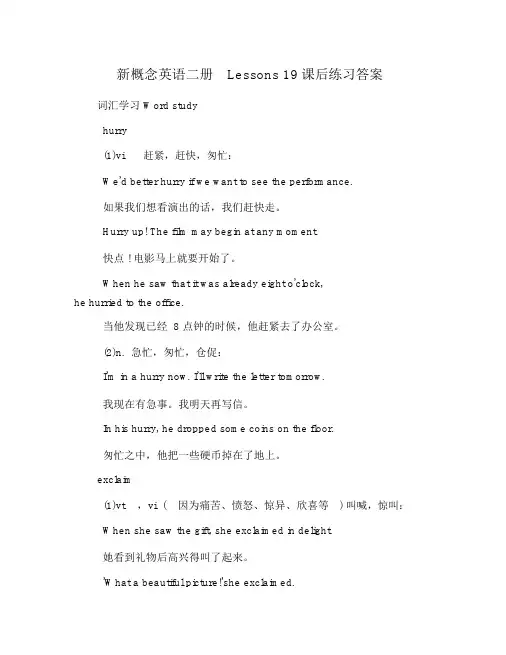
新概念英语二册Lessons 19课后练习答案词汇学习 Word studyhurry(1)vi.赶紧,赶快,匆忙:We'd better hurry if we want to see the performance.如果我们想看演出的话,我们赶快走。
Hurry up! The film may begin at any moment.快点 ! 电影马上就要开始了。
When he saw that it was already eight o'clock,he hurried to the office.当他发现已经 8 点钟的时候,他赶紧去了办公室。
(2)n. 急忙,匆忙,仓促:I'm in a hurry now. I'll write the letter tomorrow.我现在有急事。
我明天再写信。
In his hurry, he dropped some coins on the floor.匆忙之中,他把一些硬币掉在了地上。
exclaim(1)vt.,vi. (因为痛苦、愤怒、惊异、欣喜等) 叫喊,惊叫:When she saw the gift, she exclaimed in delight.她看到礼物后高兴得叫了起来。
'What a beautiful picture!'she exclaimed.她惊讶地叫道: " 多美的一幅画呀 !"(2)vi.,(表示抗议等)大声叫喊:She exclaimed against the rudeness of the young man.她愤怒地斥责那位年轻人的粗鲁行为。
return(1)vi.回,返回:Tim has just returned from Australia.蒂姆刚从澳大利亚回来。
He returned home yesterday.他昨天回来的。
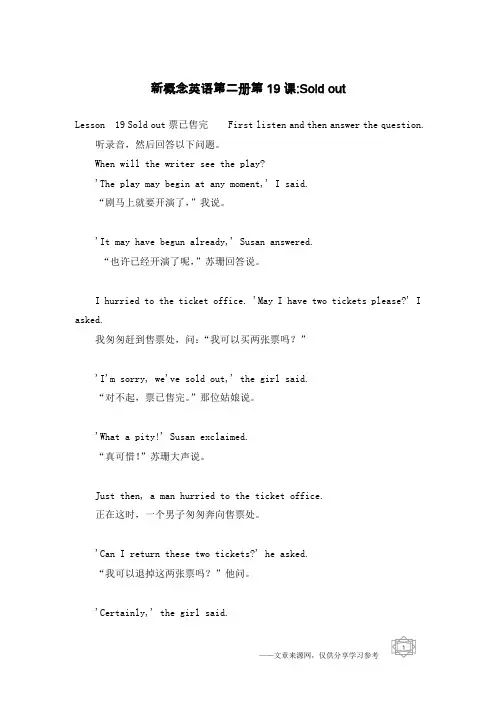
新概念英语第二册第19课:Sold outLesson 19 Sold out票已售完First listen and then answer the question.听录音,然后回答以下问题。
When will the writer see the play?'The play may begin at any moment,' I said.“剧马上就要开演了,”我说。
'It may have begun already,' Susan answered.“也许已经开演了呢,”苏珊回答说。
I hurried to the ticket office. 'May I have two tickets please?' I asked.我匆匆赶到售票处,问:“我可以买两张票吗?”'I'm sorry, we've sold out,' the girl said.“对不起,票已售完。
”那位姑娘说。
'What a pity!' Susan exclaimed.“真可惜!”苏珊大声说。
Just then, a man hurried to the ticket office.正在这时,一个男子匆匆奔向售票处。
'Can I return these two tickets?' he asked.“我可以退掉这两张票吗?”他问。
'Certainly,' the girl said.“当然可以,”那姑娘说。
I went back to the ticket office at once.我马上又回到售票处。
'Could I have those two tickets please?' I asked.“我可以买那两张票吗?”我问。
'Certainly,' the girl said, 'but they're for next Wednesday's performance. Do you still want them?'“当然可以,不过这两张票是下星期三的,您是否还要呢?”'I might as well have them,' I said sadly.“我还是买下的好,”我垂头丧气地说。
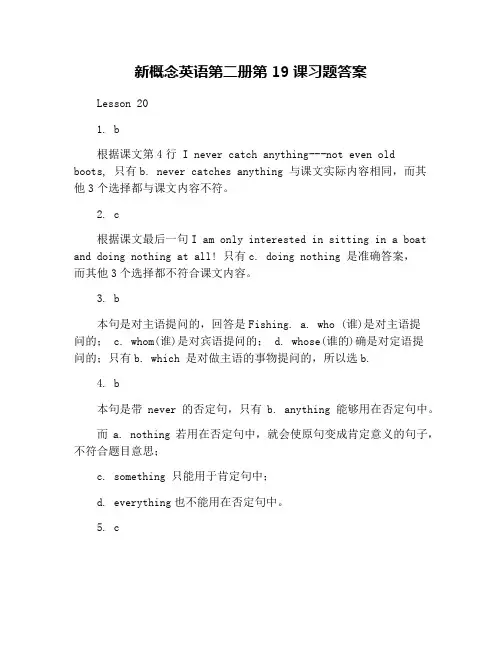
新概念英语第二册第19课习题答案Lesson 201. b根据课文第4行 I never catch anything---not even old boots, 只有b. never catches anything 与课文实际内容相同,而其他3个选择都与课文内容不符。
2. c根据课文最后一句I am only interested in sitting in a boat and doing nothing at all! 只有c. doing nothing 是准确答案,而其他3个选择都不符合课文内容。
3. b本句是对主语提问的,回答是Fishing. a. who (谁)是对主语提问的; c. whom(谁)是对宾语提问的; d. whose(谁的)确是对定语提问的;只有b. which 是对做主语的事物提问的,所以选b.4. b本句是带never的否定句,只有b. anything 能够用在否定句中。
而a. nothing若用在否定句中,就会使原句变成肯定意义的句子,不符合题目意思;c. something 只能用于肯定句中;d. everything也不能用在否定句中。
5. c前面句子 I am even less lucky 中的 less(不及)是表示否定意义的比较级,只有c. not so 是表示否定意义的,而其他3个选择都没有否定的意思.6. b只有b. an empty bag 最符合语法。
而其他3个选择都有语法错误。
a. a empty bag 中empty 是以元音开头的,前面不能用a 而应该用an; c. empty bag 中 bag 是可数名词,需要用an 来修饰; d. one empty bag 不符合习惯用法,单数可数名词前通常用不定冠词a或an 修饰,除非表示强调才用one 修饰。
所以应该选b.7. c只有c. all 才能使这个句子同前一句I am only interested in doing nothing.的含义相符合,all等于the things that ,能够代替doing nothing. 而其他3个选择中a. only 和d. the only 不符合语法,b. the one 不符合题目意思,不能完全表达清楚。
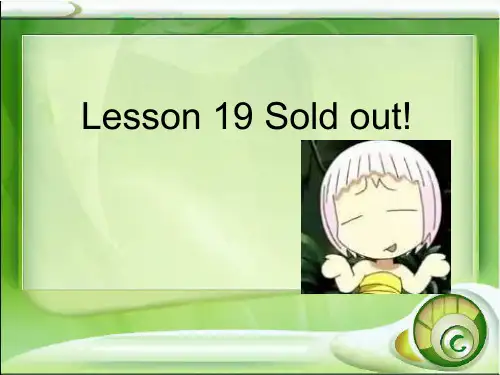
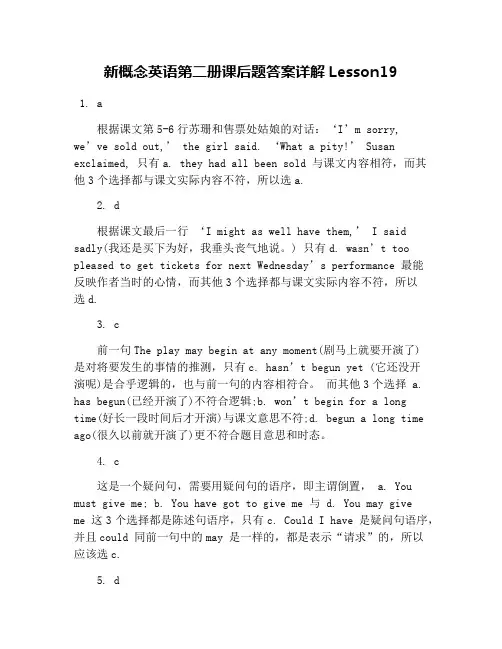
新概念英语第二册课后题答案详解Lesson191. a根据课文第5-6行苏珊和售票处姑娘的对话:‘I’m sorry,we’ve sold out,’ the girl said. ‘What a pity!’ Susan exclaimed, 只有a. they had all been sold 与课文内容相符,而其他3个选择都与课文实际内容不符,所以选a.2. d根据课文最后一行‘I might as well have them,’ I said sadly(我还是买下为好,我垂头丧气地说。
) 只有d. wasn’t too pleased to get tickets for next Wednesday’s performance 最能反映作者当时的心情,而其他3个选择都与课文实际内容不符,所以选d.3. c前一句The play may begin at any moment(剧马上就要开演了)是对将要发生的事情的推测,只有c. hasn’t begun yet (它还没开演呢)是合乎逻辑的,也与前一句的内容相符合。
而其他3个选择 a. has begun(已经开演了)不符合逻辑;b. won’t begin for a longtime(好长一段时间后才开演)与课文意思不符;d. begun a long time ago(很久以前就开演了)更不符合题目意思和时态。
4. c这是一个疑问句,需要用疑问句的语序,即主谓倒置, a. You must give me; b. You have got to give me 与 d. You may giveme 这3个选择都是陈述句语序,只有c. Could I have 是疑问句语序,并且could 同前一句中的may 是一样的,都是表示“请求”的,所以应该选c.5. d动词let 后面只能跟不带to 的动词不定式才合乎语法即let sb. do sth.. a. having 是现在分词,不符合语法; b. to have 中动词不定式不应该带to, 也不合乎语法;c. had 是动词的过去式,也不符合语法; 只有d. have 是不带to 的动词不定式,所以应该选d.6. b这个句子的时间状语 next Wednesday 下星期三,班是表示将来的时间,所以需要用将来时态。
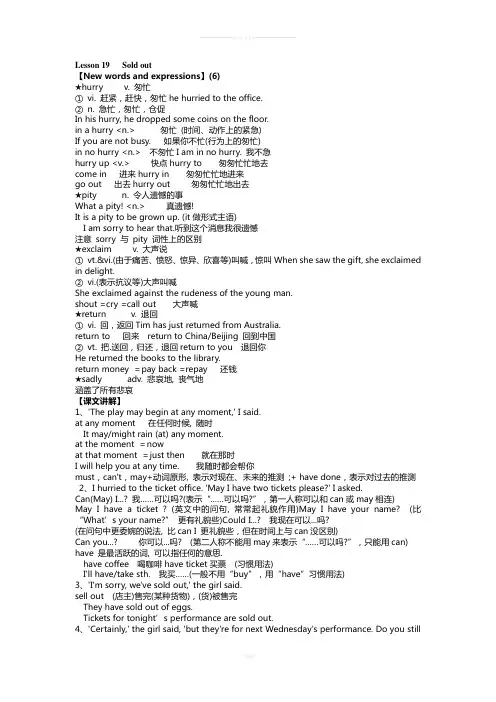
Lesson 19 Sold out【New words and expressions】(6)★hurry v. 匆忙①vi. 赶紧,赶快,匆忙he hurried to the office.②n. 急忙,匆忙,仓促In his hurry, he dropped some coins on the floor.in a hurry <n.> 匆忙(时间、动作上的紧急)If you are not busy. 如果你不忙(行为上的匆忙)in no hurry <n.> 不匆忙I am in no hurry. 我不急hurry up <v.> 快点hurry to 匆匆忙忙地去come in 进来hurry in 匆匆忙忙地进来go out 出去hurry out 匆匆忙忙地出去★pity n. 令人遗憾的事What a pity! <n.> 真遗憾!It is a pity to be grown up. (it做形式主语)I am sorry to hear that.听到这个消息我很遗憾注意sorry 与pity 词性上的区别★exclaim v. 大声说①vt.&vi.(由于痛苦、愤怒、惊异、欣喜等)叫喊,惊叫When she saw the gift, she exclaimed in delight.②vi.(表示抗议等)大声叫喊She exclaimed against the rudeness of the young man.shout =cry =call out 大声喊★return v. 退回①vi. 回,返回Tim has just returned from Australia.return to 回来return to China/Beijing 回到中国②vt. 把.送回,归还,退回return to you 退回你He returned the books to the library.return money =pay back =repay 还钱★sadly adv. 悲哀地, 丧气地涵盖了所有悲哀【课文讲解】1、'The play may begin at any moment,' I said.at any moment 在任何时候, 随时It may/might rain (at) any moment.at the moment =nowat that moment =just then 就在那时I will help you at any time. 我随时都会帮你must,can't,may+动词原形, 表示对现在、未来的推测;+ have done,表示对过去的推测2、I hurried to the ticket office. 'May I have two tickets please?' I asked.Can(May) I...? 我……可以吗?(表示“……可以吗?”,第一人称可以和can或may相连)May I have a ticket ? (英文中的问句, 常常起礼貌作用)May I have your name? (比“What’s your name?” 更有礼貌些)Could I...? 我现在可以...吗?(在问句中更委婉的说法, 比can I 更礼貌些,但在时间上与can没区别)Can you...? 你可以...吗? (第二人称不能用may来表示“……可以吗?”,只能用can) have 是最活跃的词, 可以指任何的意思.have coffee 喝咖啡have ticket买票(习惯用法)I'll have/take sth. 我买……(一般不用“buy”,用“have”习惯用法)3、'I'm sorry, we've sold out,' the girl said.sell out (店主)售完(某种货物),(货)被售完They have sold out of eggs.Tickets for tonight’s performance are sold out.4、'Certainly,' the girl said, 'but they're for next Wednesday's performance. Do you stillwant them?'for next Wednesday's performance,用名词所有格来取代时间,“……时间的”用介词for, 起修饰作用ticket for+事情……的票ticket to+地点去……的票still adv. 还,可以和任意时态连用still, yet 都和完成时态连用(原先认为)5、'I might as well have them,' I said sadly.may/might as well+动词原形还是……好(无可奈何),不妨…I might as well take the umbrella with me.had better+动词原形最好……(积极心态)【Key structures】Can and May1、can和may都可以表示请求,can可以用could,may可以用might代替,语气更委婉,更有礼貌,但时间上没有区别Can /Could I use your phone please? May I use your phone please?/Might I use your phone please?含有情态动词的普通回答:肯定:Of course you can/may.否定:No, you can’t/ may not.2、may和might还可以表示推测,“可能……”。
Lesson 19 Sold out 票已售完'The play may begin at any moment,' I said.'It may have begun already,' Susan answered.I hurried to the ticket office. 'May I have two tickets please?' I asked.'I'm sorry, we've sold out,' the girl said.'What a pity!' Susan exclaimed.Just then, a man hurried to the ticket office.'Can I return these two tickets?' he asked.'Certainly,' the girl said.I went back to the ticket office at once.'Could I have those two tickets please?' I asked.'Certainly,' the girl said, 'but they're for next Wednesday's performance. Do you still want them?''I might as well have them,' I said sadly.New words and expressions 生词和短语hurry v. 匆忙ticket office 售票处pity n. 令人遗憾的事exclaim v. 大声说return v. 退回sadly adv. 悲哀地,丧气地参考译文“剧马上就要开演了,”我说。
新概念英语第二册课后题答案详解:Lesson19
新概念英语第二册课后习题 Lesson 19
1. a
根据课文第5-6行苏珊和售票处姑娘的对话:‘I’m sorry,
we’ve sold out,’ the girl said. ‘What a pity!’ Susan exclaimed, 只有a. they had all been sold 与课文内容相符,而其他3个选择都与课文实际内容不符,所以选a.
2. d
根据课文最后一行‘I might as well have them,’ I said sadly(我还是买下为好,我垂头丧气地说。
) 只有d. wasn’t too pleased to get tickets for next Wednesday’s performance 最能
反映作者当时的心情,而其他3个选择都与课文实际内容不符,所以
选d.
3. c
前一句The play may begin at any moment(剧马上就要开演了)
是对将要发生的事情的推测,只有c. hasn’t begun yet (它还没开
演呢)是合乎逻辑的,也与前一句的内容相符合。
而其他3个选择 a. has begun(已经开演了)不符合逻辑;b. won’t begin for a long
time(好长一段时间后才开演)与课文意思不符;d. begun a long time ago(很久以前就开演了)更不符合题目意思和时态。
4. c
这是一个疑问句,需要用疑问句的语序,即主谓倒置, a. You must give me; b. You have got to give me 与 d. You may give
me 这3个选择都是陈述句语序,只有c. Could I have 是疑问句语序,并且could 同前一句中的may 是一样的,都是表示“请求”的,所以
应该选c.
动词let 后面只能跟不带to 的动词不定式才合乎语法即let sb. do sth.. a. having 是现在分词,不符合语法; b. to have 中动词
不定式不应该带to, 也不合乎语法;c. had 是动词的过去式,也不符合语法; 只有d. have 是不带to 的动词不定式,所以应该选d.
6. b
这个句子的时间状语 next Wednesday 下星期三,班是表示将来
的时间,所以需要用将来时态。
a. was 是过去时,不对。
c. shall be 是将来时,但shall只能用在第一人称,而本句主
语是第三人称。
d. has been 是现在完成时,不对。
只有b. will be 是将来时,符合时态和人称的要求,所以选b.
本句的意思是:演出将在下星期三实行。
7. c
前一句子I might as well have them(我还是把他们买下来吧),表示说话人不情愿或勉强这样做。
a. very pleased(非常高兴), b. very glad(很高兴) 与d. delighted(极为高兴)都与这个句子的含义相反,只有c. not very glad 符合题目意思,所以选c.
8. b
只有b. went there quickly 与前一句中的hurried to (匆匆赶到) 的意思相同。
而 a. went there(去那) 意思不准确; c. went there slowly (慢慢走到那儿)与hurrie d to …意思相反; d.
didn’t go there (没有去那儿)更不符合题目意思。
只有c. sorry (遗憾)同前面的what a pity(真可惜) 意思相符合,而其他3个选择都与其含义相反,所以选c.
10. a
只有 a. give them back 与前面的returned(还给) 的意思相同,而其他3个选择b. give them in (交上它们), c. give them up (放弃它们) , d. give them off(发放它们) 都没有“归还” 的意思。
11. c
只有c. Of course(当然) 同前一句中的Certainly 是同义词。
而其他3个选择都不准确。
12. c
只有c. now 才能使句子同前面的句子Do you still want them? (你还想要它吗?)的意思吻合.而a. yet, b. even, d. more 都不符合语法和题目意思.。